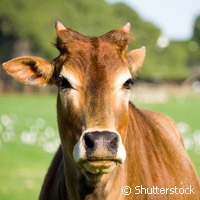Climate change? Blame it on production practices, not just cows
Environmentalists say cows' methane-filled flatulence and burps are partly responsible for the changes in the earth's climate. But a new study from the Kenya-based International Livestock Research Institute (ILRI) suggests that we can curb cattle-generated greenhouse gas emissions by improving degraded lands, making breeds stronger and changing the animals' diets. The study's findings are published in the Proceedings of the National Academy of Sciences (PNAS) journal. These changes in production would not only impact the environment, but livestock operators would stand to win big as well. Poor farmers in particular could potentially incur payments worth USD 1.3 billion (approx. EUR 1 billion) each year by selling saved carbon on the global markets. 'These technologically straightforward steps in livestock management could have a meaningful effect on greenhouse gas build-up, while simultaneously generating income for poor farmers,' explains co-author Professor Philip Thornton from ILRI and Denmark's University of Copenhagen. Businesses operating in the livestock industry are responsible for 18% of global greenhouse gas emissions. These emissions are triggered by deforestation in tropical countries to make room for livestock grazing and feed crops, cattle's own methane emissions, and the nitrous oxide emitted by manure. According to the ILRI, there is growing concern that increased livestock production - the result of trying to cover the heightened demand for milk and meat in developing countries - will fuel these greenhouse gas emissions even further. Professor Thornton and his colleague Dr Mario Herrero, also from the ILRI, suggest that alternatives are readily available that could hinder the production of up to 417 million tonnes of carbon dioxide (CO2) from livestock in tropical countries in the next 20 years. This whopping number covers some 7% of the greenhouse gas emissions generated by livestock worldwide. The researchers go on to say that decreasing milk and meat consumption would contribute significantly to carbon storage on our planet. Over 500 million livestock keepers in tropical countries would need to make cuts, but the research reveals that these poor farmers could be encouraged to adopt practices that are better for our environment, better for our lives. 'It would be a useful incentive if these farmers were allowed to sell the reductions they achieve as credits on global carbon markets,' Professor Thornton pointed out. 'We found that at USD 20 [EUR 16] per tonne - which is what carbon was trading for last week on the European Climate Exchange - poor livestock keepers in tropical countries could generate about USD 1.3 billion each year in carbon revenues.' While the carbon payments are not expected to provide sizeable increases in the farmers' income, they would help sway smallholders who are thinking of expanding their livestock production. Changes in production practices, including using more nutritious pasture grasses, as well as restoring degraded grazing lands, planting trees and supplementing animal diets, would help accelerate reductions in livestock-related greenhouse gas emissions. Commenting on the study's focus on tropical countries, Dr Herrero says: 'We wanted to consider the impact in tropical countries because they are at the epicentre of a livestock revolution. We expect consumption of milk and meat to roughly double in the developing world by 2050, which means it's critical to adopt sustainable approaches now that contain and reduce the negative effects of livestock production, while allowing countries to realise the benefits, such as better nutrition and higher incomes for livestock-producing households.' For his part, ILRI Director General Carlos Seré said this latest study helps mitigate talk of how cattle contribute to climate change, focusing instead on determining how best to tackle the effects of their increased production on the environment. He states, 'There is a tendency today to simply demonise livestock as a cause of climate change without considering their importance, particularly for poor farmers in the developing world.'
Countries
Denmark, Kenya



